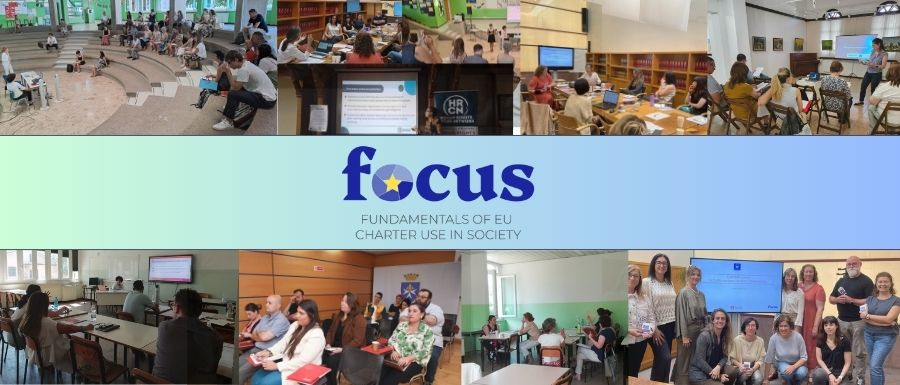Between April 2024 and July 2025, ALDA has been leading efforts to promote the local implementation of the EU Charter of Fundamental Rights through the FOCUS project, coordinating the activities of Work Package 5. The goal? To bring the Charter closer to the people, starting with local authorities, and extending to civil society organisations and citizens.
In partnership with Democracy Reporting International, ALDA established a Community of Interest and co-organised the International Training of Multipliers, offering participants a deep dive into the Charter’s scope, legal value, and practical application. The training not only provided theoretical tools but also created space for personal reflection on how EU values play out in everyday governance.
Following the international training, members of the Community of Interest brought this knowledge to their own territories, delivering local follow-up trainings in the Municipality of Brescia (Italy), Barcelona Provincial Council (Spain), Human Rights Cities Network (Belgium), RAM Central Stara Planina (Bulgaria), and Local Councils Association (Malta). Using an interactive, case-based approach, and supported by official manuals and practical guides, the sessions aimed to increase awareness of the Charter, encourage reflection on its local relevance, and stimulate transnational dialogue.
In total, 69 participants representing municipalities and local stakeholders took part in these sessions between May and July 2025. While each training was tailored to the local context, one common theme emerged: a stronger, more practical understanding of the Charter is urgently needed at the local level.
The local trainings revealed a range of priorities across the five countries. In Italy, the focus was on fiscal justice and social inclusion, with challenges such as tax evasion and non-inclusive policies prompting calls for stronger monitoring and legislation grounded in equality and solidarity. Belgium’s sessions highlighted the need for clearer communication on data protection and digital rights, alongside improving urban accessibility for people with disabilities. Spain concentrated on building a solid understanding of the Charter among municipalities to support consistent rights-based practices. Bulgaria raised concerns about environmental protection and personal data transparency amid growing public awareness. Meanwhile, Malta tackled the pressing issue of urban overdevelopment in Valletta, proposing measures like heritage impact assessments, affordable housing, and increased civic participation to preserve cultural identity and support residents.
Thanks to the active involvement of Community of Interest members and the technical support provided by ALDA and DRI, the local trainings have not only deepened the understanding of the Charter, but also generated a comparative overview of challenges and solutions across the five countries. A training details table, complete with narrative reports, offers further insight into each session’s outcomes.
By anchoring EU values in local realities, this initiative takes a crucial step toward making the Charter more than just a legal document, but a living framework for inclusive, rights-based policymaking across Europe
It is important to remember that the fundamental rights protected by the EU Charter are part of a universal framework that applies to all individuals, regardless of their location or political context. Just as local communities across Europe work to uphold these rights, many populations in complex situations, such as in Palestine, Congo and Sudan, continue to face significant challenges in accessing and exercising their fundamental freedoms. This shared struggle underlines the global importance of promoting and protecting human rights everywhere.
